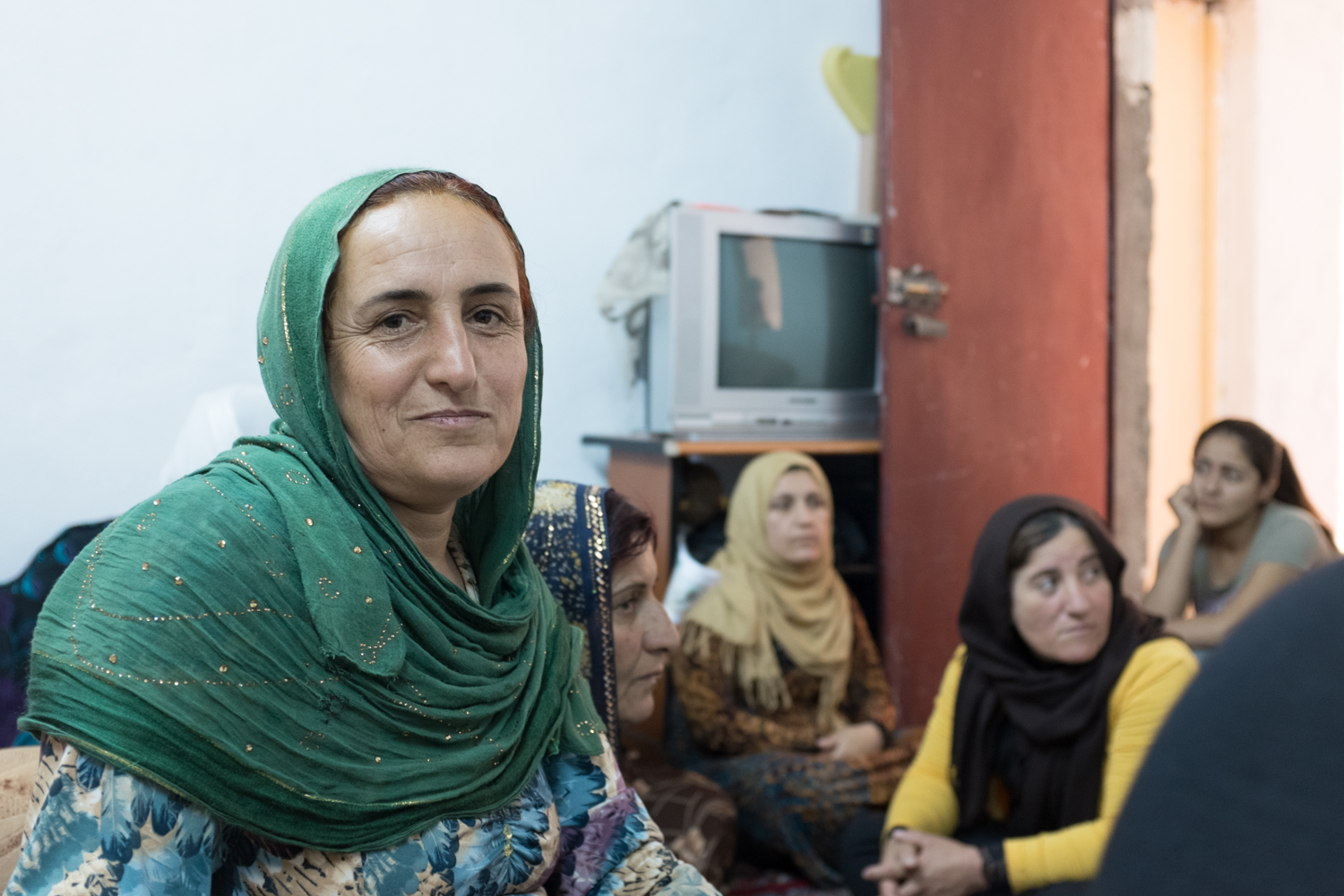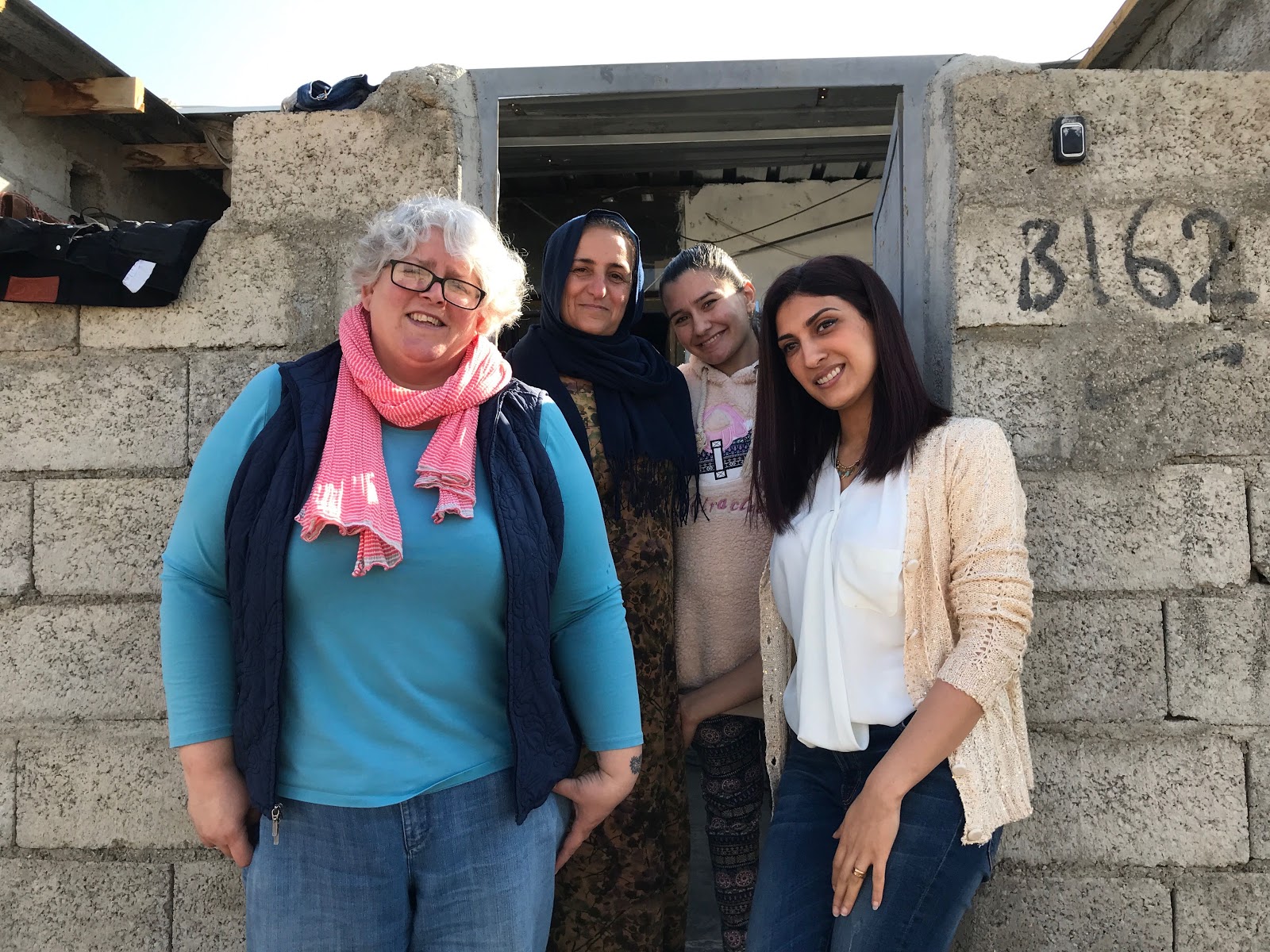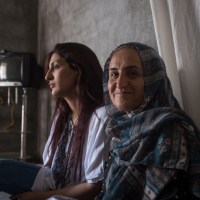“I share my story with them, I share my pain with them, and I never feel shy because in the same way they trust me, I have to trust them.”
We meet Jameela one afternoon at her home in a refugee camp in northern Iraq, weaving between rows of washing, through a small wooden door and into the guest room. As she ushers us in, you can’t help but notice her natural ability to make a person feel instantly comfortable. Inquisitive and perceptive, with a warm and approachable demeanor, she makes easy conversation as her youngest son offers sweet tea and watermelon seeds to her guests.
Women are so often underestimated, their strength overlooked and their power unnoticed. Outside eyes reduce them to the weak, passive stereotype of ‘woman’ that resonates across the world.
This rings particularly true for women in vulnerable situations, and those living through conflict and displacement are so easily cast as the ‘victim’. But throughout our days working closely with refugees, we have seen how these women are often a force to be reckoned with, a source of great strength and survival whose simple presence can challenge any stereotype.
One of these women is Jameela, from northeastern Syria. She has spent the last three years living in a refugee camp in northern Iraq with three of her sons. With her husband and other son in Germany, Jameela has become a pillar of strength among her family and community as she patiently waits for her family to be reunited.

What we didn’t expect was how Jameela would also be a pillar of strength for us. With her fierce commitment and reliability, she is an invaluable source of guidance and support to members of our team. For Inas, who works with our refugee friends to start new businesses, Jameela’s home offers a place of comfort and refuge where she can go after long, emotionally draining days working in the camp. The two women have known each other for the last few years, and while they met through Inas’ work, they have developed a deep bond that far transcends the typical dynamic between aid workers and their beneficiaries.
“This trust and love and friendship between me and Jameela came without planning. She understands me without talking, and I understand her. I feel I found my soulmate there,” Inas says.
While their individual paths in life have been so different, their journeys have led them both to this same point in northern Iraq. Inas is from Iraq and Jameela from Syria, two separate countries that experienced two separate wars, but today both women find themselves together in a shared space of compassion and understanding. In Jameela’s house, Inas says, if women, “want to share and talk about their pain, they feel they are warm. Because they are talking with someone who cares.”
Connecting all these women in the camp in northern Iraq is this essence of patience, a trait passed down from their mothers and shared among each other to create a resilient spirit and tireless inner strength that refuses to give up in the face of any hardship.
It is this special bond that allows Inas to do some of her most effective work in the camp. Together, the Inas and Jameela combine their compassionate hearts and tenacious spirits to reach out and help empower others. A woman named Nairuz was one of the first to experience this dynamism, when Inas reached out to her, with Jameela by her side as translator. Nairuz had no belief in herself, “always saying she cannot work and she is bad at everything,” says Inas. Together, the women rallied around her, encouraging Nairuz to participate in the women’s businesses and building up her sense of pride and self-worth.
Jameela continued to introduce Inas to other women in the community, driven by the belief that their dreams deserve to be taken seriously. “I spent a lot of time in Jameela’s house, talking about how we can help them,” says Inas. “They felt they were nothing in this community. Jameela started to talk about people in the camp from her perspective, how they think, and their journey moving from place to place.”
With Inas’ professional ties and Jameela’s community influence, the two make for a powerful duo, developing a sense of trust and friendship among the women in the community. With this approach, they have developed a nuanced understanding of the needs in the camp and how best they can be tackled.
“You cannot get the real story if you don’t have the friendship,” Inas explains. “The real stories I hear from day-to-day visits come from the heart. You cannot hear the real story if you do not build friendship between the families.”

Jameela remains a continuous source of strength in her community, steadfast in her determination to give to others. However, Inas can see the struggles that her friend faces in daily life, as she gives all that she has to others while forgetting to replenish herself.
“A woman is like a plant, if you put water on her she becomes shiny and amazing. But if you do not put this kind of love, she is going to die,” she says.
“You cannot get the real story if you don’t have the friendship.”
In a community heavy from the pain of war, displacement, and the loss of loved ones, Jameela has had little choice but to put on a brave face and act as a source of strength. Yet, as a lone figure with her husband far from her side, Jameela has no one to be that source for her. “She is tired. People look at her as a man and a woman at the same time, but she has to be like this in order to raise her family,” Inas has observed.
“Really she misses her husband a lot, but she never shows that. She wishes her husband to be here, to hold her, because this is the only thing she needs.”’

That day when we sat in Jameela’s home, she told us how her mother had just died. Jameela cried softly as she spoke, hurting from the loss of the woman who provided her with the unconditional love and support that she now provides to her own family.
 We asked Jameela, what was the greatest lesson her mother had taught her? The answer was patience. And it was a word that came up again a few days later as I spoke with Inas. “Jameela taught me patience,” Inas says. “When I look at Jameela, I remember my mom. I remember how she did everything in order to raise us. Our stories are different but the source is the same. We are all linked together,” she adds.
We asked Jameela, what was the greatest lesson her mother had taught her? The answer was patience. And it was a word that came up again a few days later as I spoke with Inas. “Jameela taught me patience,” Inas says. “When I look at Jameela, I remember my mom. I remember how she did everything in order to raise us. Our stories are different but the source is the same. We are all linked together,” she adds.
Connecting all these women in the camp in northern Iraq is this essence of patience, a trait passed down from their mothers and shared among each other to create a resilient spirit and tireless inner strength that refuses to give up in the face of any hardship.
And for Jameela, that patience has finally paid off. Last week she landed in Germany with two of her sons, finally reunited with her husband who she had not seen for so many years. “My wish is not something big for her,” says Inas. “She doesn’t want money or anything like that. She just wishes for love.”


